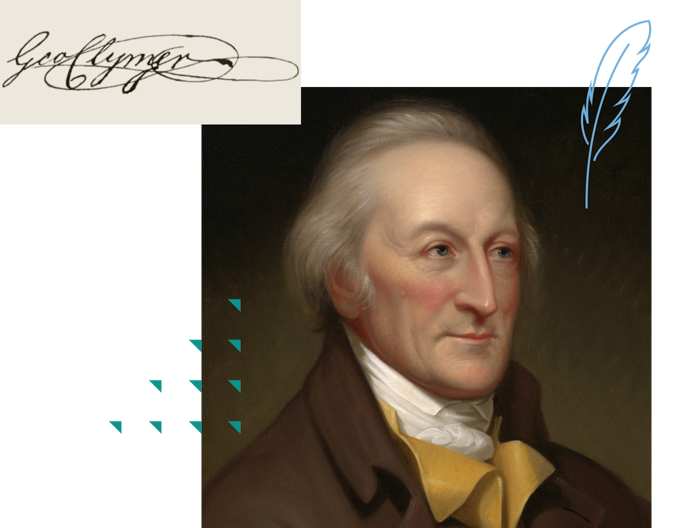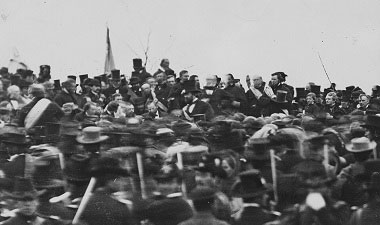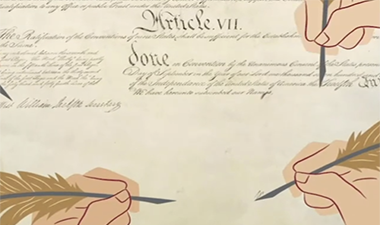Summary
George Clymer was a successful businessman from Philadelphia with no formal education. He signed the Declaration and also attended 1787 Constitutional Convention.
George Clymer | Signer of the Declaration of Independence and the Constitution
2:56
Biography
George Clymer was born in Philadelphia, the son of a sea captain and a woman disowned by the Quakers for marrying outside of the faith. George was orphaned when he was still a child, and his father left him little more than a few personal items and an enslaved man who died soon afterward. But George was raised by his mother’s sister and her husband, William Coleman, and both Coleman and Clymer’s grandfather provided generously for George in their wills. Thus, George Clymer became a wealthy young man.
George had no formal education but was an avid reader. He began his career as an apprentice to Coleman, but by 1759, he had created a trading firm of his own. When his firm merged with a larger enterprise, he married the senior partner’s daughter, Elizabeth Meredith, in 1765. Soon afterward, Clymer entered local politics, becoming a City Councilman, and later a City Alderman. Britain’s novel taxing policies in the 1760s and its tightening control over colonial trade had provoked Clymer’s concern about colonial rights. This became evident in the same year he married, when he joined 400 fellow Philadelphia merchants in signing a non-importation agreement as a response to the Stamp Act. When the Townshend Acts appeared in 1767 and 1768, he would help organize a new boycott designed to force their repeal.
The Tea Act intensified his radicalism, and he was known to complain that Philadelphia and New York merchants were too cautious when compared to those of Boston. He was pleased when lines of communication between Boston radicals and sympathetic Philadelphia merchants finally developed after the 1773 Boston Tea Party. By the time fighting broke out at Lexington and Concord, he was firmly committed to independence. He threw himself into the campaign to break ties with the Mother Country and served on a number of local revolutionary committees in the years before the Declaration of Independence was signed.
Clymer was not a member of Pennsylvania’s delegation to the Continental Congress when independence was voted on July 2nd. He was, however, part of the Pennsylvania constitutional convention that met soon afterward, and on August 2, he and the other members of that convention immediately signed the engrossed copy of the Declaration that awaited Pennsylvanian approval.
Clymer served in the Continental and Confederation Congresses in 1776 and 1777 and again in 1780 through 1782. He spoke little in congressional sessions, but was an effective member of several committees. Between his congressional terms, he worked on important projects, including the drafting of the new Pennsylvanian state constitution. The British were aware of Clymer’s active role in the struggle for independence, and when their troops marched into Philadelphia, they made a detour to vandalize Clymer’s Chester County home. His wife and children found refuge by hiding in the nearby woods.
Between 1778 and l780, Clymer took time off from political office to see to his personal affairs. He had inherited large tracts of land from his relatives, but inflation was threatening to destroy his mercantile business. Yet, even in these years out of office, he took pains to support the revolutionary cause. He led a group of Philadelphia merchants in chartering a private bank that raised funds to purchase much needed supplies for the military.
Although after the war he moved his family to a new home near Princeton and declared himself officially retired from political officeholding, he did not remain retired long. By 1784, he had moved back to Philadelphia where he served in the state legislature. He then participated in the Constitutional Convention that met in 1787, rarely missing a meeting. As usual, he said little on the Convention floor but proved himself a workhorse on many of its committees. In 1789, he was elected to serve a single term in the House of Representatives of the new federal government.
Finally retired by 1796, he devoted time to community organizations like the Philadelphia Society for Promoting Agriculture and the Pennsylvania Academy of Fine Arts. He died in 1813, at the age of 73 after a brief illness. He was one of only six men who signed the Declaration and the Constitution. He was remembered by William Pierce, who offered sketches of many of the founders, as “a respectable man, and much esteemed.”








